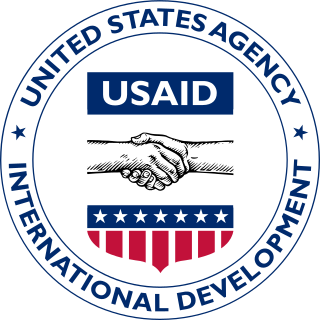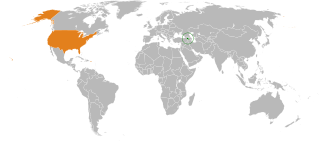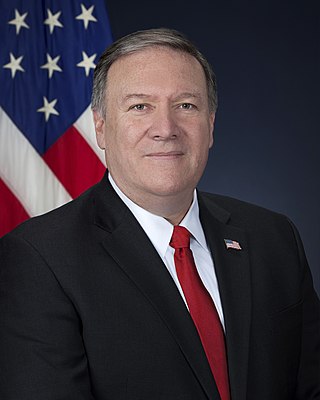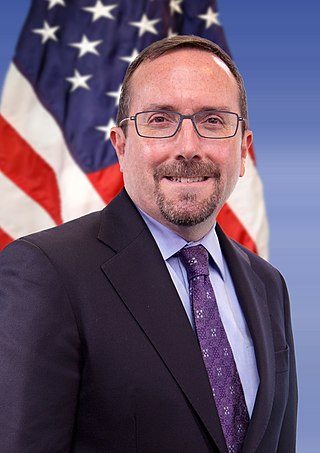"Rogue state" is a term applied by some international theorists to states that they consider threatening to the world's peace. These states meet certain criteria, such as being ruled by authoritarian or totalitarian governments that severely restrict human rights, sponsoring terrorism, or seeking to proliferate weapons of mass destruction. The term is used most by the United States ; in his speech at the United Nations (UN) in 2017, U.S. President Donald Trump reiterated this phrase. U.S. politicians have used the term to describe countries such as Iran, Syria, North Korea, Afghanistan, Cuba and Venezuela. The term has been applied by other countries as well.

The United States Agency for International Development (USAID) is an independent agency of the United States government that is primarily responsible for administering civilian foreign aid and development assistance. With a budget of over $50 billion, USAID is one of the largest official aid agencies in the world and accounts for more than half of all U.S. foreign assistance—the highest in the world in absolute dollar terms.

The National Security Archive is a 501(c)(3) non-governmental, non-profit research and archival institution located on the campus of the George Washington University in Washington, D.C. Founded in 1985 to check rising government secrecy. The National Security Archive is an investigative journalism center, open government advocate, international affairs research institute, and the largest repository of declassified U.S. documents outside the federal government. The National Security Archive has spurred the declassification of more than 15 million pages of government documents by being the leading non-profit user of the U.S. Freedom of Information Act (FOIA), filing a total of more than 70,000 FOIA and declassification requests in its over 35+ years of history.

American Foreign Service Association (AFSA), established in 1924, is the professional association of the United States Foreign Service. With over 15,000 dues-paying members, American Foreign Service Association represents 28,000 active and retired Foreign Service employees of the Department of State and Agency for International Development (AID), as well as smaller groups in the Foreign Agricultural Service (FAS), Foreign Commercial Service (FCS), and International Broadcasting Bureau (IBB).
A démarche has come to refer either to:
Archer Kent Blood was an American career diplomat and academic. He served as the last American Consul General to Dhaka, Bangladesh. He is famous for sending the strongly worded "Blood Telegram" protesting against the atrocities committed in the Bangladesh Liberation War. He also served in Greece, Algeria, Germany, Afghanistan and ended his career as chargé d'affaires of the U.S. Embassy in New Delhi, India, retiring in 1982.

GLIFAA is the officially recognized organization representing lesbian, gay, bisexual and transgender etc. (LGBT+) personnel and their families in the United States Department of State, U.S. Agency for International Development (USAID), Foreign Commercial Service, Foreign Agricultural Service, and other agencies and entities working in foreign affairs in the U.S. Government. The acronym comes from its original name, Gays and Lesbians in Foreign Affairs Agencies. As of 2014, the organization goes by GLIFAA and uses the slogan "LGBT+ pride in foreign affairs agencies" to underscore its inclusive composition. GLIFAA was founded in 1992 by fewer than a dozen employees who faced official harassment and potential loss of their jobs because of their sexual orientation. The organization has grown to hundreds of Foreign Service, Civil Service, and contract personnel and their families serving in Washington, throughout the U.S., and at U.S. embassies and missions around the world. Members also include retirees and straight allies in government agencies, while other supporters are affiliate members.

The Distinguished Honor Award is an award of the United States Department of State. Similar versions of the same award exist for the former U.S. Information Agency, Arms Control and Disarmament Agency, and USAID. It is presented to groups or individuals in recognition of exceptionally outstanding service or achievements of marked national or international significance.

The dissolution of the Soviet Union in December 1991 brought an end to the Cold War and created an opportunity for establishing bilateral relations between the United States with Armenia and other post-Soviet states as they began a political and economic transformation. The United States recognized the independence of Armenia on 25 December 1991, and opened an embassy in Armenia's capital Yerevan in February 1992.

U.S.–Uzbekistan relations formally began when the United States recognized the independence of Uzbekistan on December 25, 1991, and opened an embassy in Tashkent in March 1992. U.S.-Uzbekistan relations developed slowly and reached a peak following the U.S. decision to invade Afghanistan following the September 11, 2001 attacks. Relations cooled significantly following the "color revolutions" in the former Soviet republics of Georgia, Ukraine, and Kyrgyzstan in 2003–2005, and the Government of Uzbekistan sought to limit the influence of U.S. and other foreign non-governmental organizations (NGOs) working on civil society, political reform, and human rights inside the country.

Bolivia–United States relations were established in 1837 with the first ambassadorial visit from the United States to Peru–Bolivian Confederation. The Confederation dissolved in 1839, and bilateral relations did not occur until 1848 when the United States recognized Bolivia as a sovereign state and appointed John Appleton as the Chargé d'Affaires.

Haiti–United States relations are bilateral relations between Haiti and the United States. Succeeding U.S. presidents refused to recognize Haiti until Abraham Lincoln. The U.S. tried to establish a military base in Haiti and invaded. It withdrew in 1934 but continued to intervene in Haiti during subsequent decades.

Earl Anthony Wayne is an American diplomat. Formerly Assistant Secretary of State for Economic and Business Affairs, Ambassador to Argentina and Deputy Ambassador to Afghanistan, Wayne served nearly four years as Ambassador to Mexico. He was nominated by President Obama and confirmed by the Senate in August, 2011. He departed Mexico City for Washington July 31, 2015 and retired from the State Department on September 30, 2015. Wayne attained the highest rank in the U.S. diplomatic service: Career Ambassador. He is currently a Professorial Lecturer and Distinguished Diplomat in Residence at American University's School of International Service where he teaches courses related to diplomacy and US foreign policy. Wayne also works with the Woodrow Wilson International Center for Scholars, the Atlantic Council, the Center for Strategic and International Studies,. Wayne is co-chair of the Mexico Institute's Advisory Board at the Wilson Center. He is also on the board of the American Academy of Diplomacy and the Public Diplomacy Council of America. Wayne is an independent consultant, speaker and writer and works with several not-for-profit professional associations. He was an adviser for HSBC Latin America on improving management of financial crime risk from 2015 until 2019 and served on the board of the American Foreign Service Association from 2017 to 2019.
Pakistan receives foreign aid from several countries and international organizations.

Michael Richard Pompeo is an American politician who served in the administration of Donald Trump as director of the Central Intelligence Agency (CIA) from 2017 to 2018 and as the 70th United States secretary of state from 2018 to 2021. He also served in the United States House of Representatives from 2011 to 2017.
The United States diplomatic cables leak, widely known as Cablegate, began on Sunday, 28 November 2010 when WikiLeaks began releasing classified cables that had been sent to the U.S. State Department by 274 of its consulates, embassies, and diplomatic missions around the world. Dated between December 1966 and February 2010, the cables contain diplomatic analysis from world leaders, and the diplomats' assessment of host countries and their officials.
Contents of the United States diplomatic cables leak has depicted Europe and related subjects extensively. The leak, which began on 28 November 2010, occurred when the website of WikiLeaks—an international new media non-profit organisation that publishes submissions of otherwise unavailable documents from anonymous news sources and news leaks—started to publish classified documents of detailed correspondence—diplomatic cables—between the United States Department of State and its diplomatic missions around the world.

John Rodney Bass II is an American diplomat, who has served as the under secretary of state for management since December 2021. He was the United States ambassador to Afghanistan from 2017 to 2020, the United States ambassador to Turkey from 2014 to 2017 and the United States ambassador to Georgia from 2009 to 2012.
David Holmes is an American diplomat who served as a counselor for political affairs at the U.S. Embassy in Ukraine circa 2019-2020. He is at Georgetown University School of Foreign Service as Senior State Department Fellow, as of 2022.
Donald K. Steinberg is an American diplomat who was the U.S. Ambassador to Angola. He is also the former president and CEO of World Learning.












